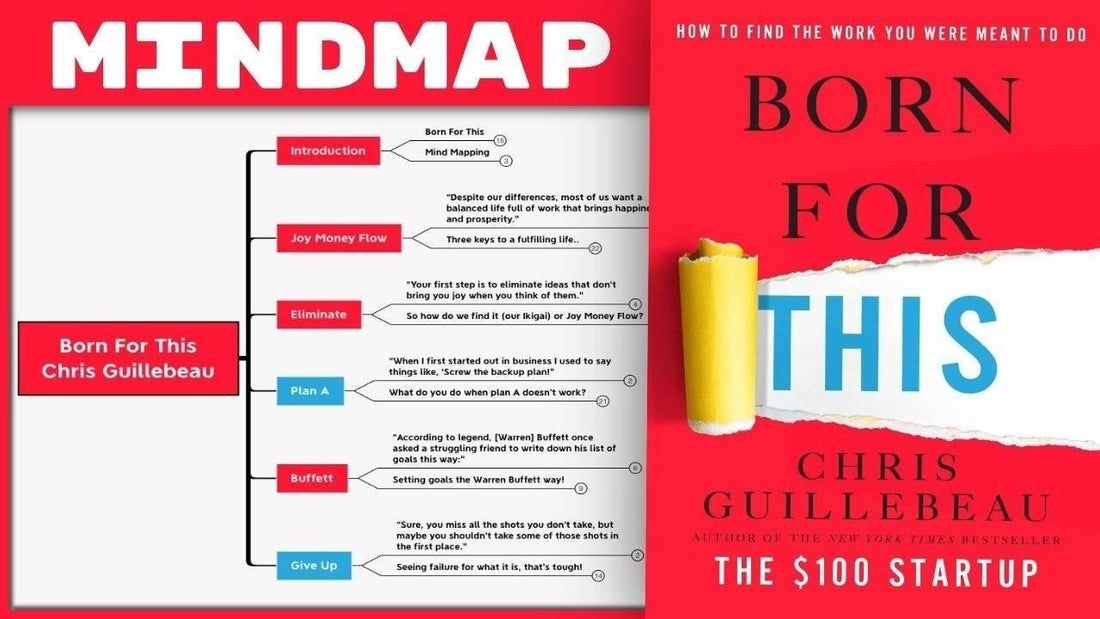Video Book Summary
Download all of the Mind Maps here.
Book Summary Notes
Born For This
“What if you don’t want to settle? What if you want to find the work that you truly love and you don’t want to eat ramen noodles every night? Why can’t you have it all?"
"Happily, you can. As you’ll see throughout this book, some people manage to find this work."
"They’ve won the career lottery, and the results weren’t all determined by chance. Whether through their own brilliance or, more likely, as a result of trial and error, they’ve found the work they were born to do—and that’s what makes all the difference."
"This book will help you find that thing, too.”
What was I born to do?
A question most of us have asked..
But did you ever really find an answer?
If not, this book is for you!
Chris has a ton of experience helping people find their calling!
He's the author of the $100 startup, The Happiness of Pursuit and The Art of Non-Conformity.
Books where he walks us through other peoples journey to financial independence, freedom and living a life of purpose and meaning.
This book is filled with ideas to help us:
1. Find our true passion
2. Connect it to our vocation
3. Tap into our highest selves
Joy Money Flow
“Despite our differences, most of us want a balanced life full of work that brings happiness and prosperity."
"As much as possible, we want to do something we enjoy. We want to put our skills to good use. And ideally, we don’t want to face a false choice between love or money—we’d like to do what we love and be well compensated for it."
"Put simply, here’s what we’re looking for:"
- Something that makes us happy (joy)
- Something that’s financially viable (money)
- Something that maximizes our unique skills (flow)”
Three keys to a fulfilling life..
Joy
- Something that makes us happy.
- What do you love so much that you'd do it for free?
- What gets you out of bed every morning?
Money
- Something financially viable.
- What can you be paid for?
- What does the world need?
Flow
- Something that maximizes your unique skills.
- What are your unique strengths?
- What's a skill you can commit to master?
The Career Lottery
- Chris calls having all three of these areas maximized winning the career lottery!
- JOY + MONEY + FLOW = Career Lottery
- joy + MONEY + FLOW = Success Without Purpose
- JOY + money + FLOW = Starving Artist
- JOY + MONEY + flow = Unfulfilled Potential
Eliminate
“Your first step is to eliminate ideas that don’t bring you joy when you think of them."
"This should usually be the initial decision-making criterion, because life is short and you certainly don’t want to do something you don’t like."
"You should next eliminate ideas that don’t have real potential to produce income. This doesn’t mean you can’t do those things as a hobby, but this book isn’t about hobbies. The goal is to make career changes that bring happiness and income."
"Finally, you should eliminate ideas that you aren’t particularly good at, or where your skills aren’t unique."
"Remember that there’s more than one path. But finding your dream career isn’t about what you can do; it’s about what you should do. The goal isn’t just to find any possible path but to find the path that is best for you.”
So how do we find it (our Ikigai) or Joy Money Flow?
Start with the easiest part first!
- What DON'T you want to do? (What doesn't bring you joy).
- Write down a list of all the things you need to eliminate from your life.
- Hate working in an office? Write it down.
- Hate having to report to someone? Write it down.
- Hate working on quarterly reports? Write it down.
Next, what doesn't have a chance to make money?
- This one can take some practice! If you don't have business experience you might not know.
- A good place to start here is by finding others examples. Is someone already doing a version of what you want to do as a business or career? Likely it can work.
Finally, what aren't you particularly well suited for?
- I tend to think that we really only get joy from the things we're already well suited for. Especially particular fields.
- But a field from the outside can look much different than it is from the inside.
- Actors don't spend most of their time watching theirselves on the big screen. Instead it's about hours and hours of repetitive practice and memorization. Are you good at that?
- So the tip here might be, look at what a day in the life of the idea you're contemplating really looks like. Would you be well suited for it?
Plan A
“When I first started out in business I used to say things like, ‘Screw the backup plan!"
"Backup plans are for wimps.’ But now I know that this isn’t usually the greatest idea. Backup plans don’t make us wimpy; they actually allow us to take on more risk."
"The next time you take on a potentially risky gambit or endeavor, sit down and sketch out your own ‘if-then’ equation. Remember, there can always be a backup plan. If plan A fails, you have 25 letters left.”
What do you do when plan A doesn't work?
That's the deciding factor in a lot of success..
Some people give up at the first sign of failure, deciding instead to pursue a different path.
This is a great way to make sure you never succeed! Plan A almost always fails.
But the secret is, that failure should be expected and learned from. Not run away from.
Ryan Holiday has a great book called The Obstacle is The Way.
“The obstacle in the path becomes the path. Never forget, within every obstacle is an opportunity to improve our condition.”
Check out the Mind Map video for more on this.
Minimizing the risk of plan A:
- From the outside, entrepreneurship or making big changes in life can seem risky..
- Often it seems like people risk it all and have it pay off with massive success..
Those stories are told so often it can feel like that's the only path to success!
But not told, are the thousands of stories of those who didn't make it..
How do we make sure we're likely to become the one who's successful and not the one who didn't make it?
First, of course we have to take the shot! There are even more stories of those who sat on the sidelines.
But then, we need to minimize our risk! That's where a backup plan comes in.
There is no need to push your back up against a wall to succeed.
Each of the businesses I have started I've had backup plans.
- 1. I started them all with essentially no money down and self financed. Often working another job while getting started.
- 2. I always had an emergency fund in the bank of over a year of expenses.
- 3. I made sure to keep connections and skills so that worst case I could go back to my old jobs.
This is how I've been able to stay an entrepreneur for so long.. Because failure certainly does happen. Luckily I haven't had to rely on any of those for quite some time. But in the beginning they were lifesaving.
Buffett
“According to legend, [Warren] Buffett once asked a struggling friend to write down his list of goals this way:"
1. First, make a list of the top 25 things you’d like to do in life.
2. Next, circle the top five things from this list. Choose wisely!
3. Discard the other 20 items. Work only on tasks that relate to your top five goals.
"The principle is that you can’t work hard on 25 important things at once."
"You might think that the other 20 are still important, just not as important as the top five."
"But no—Buffett’s advice is to run away from the non-circled items as fast as you can. By choosing only five life goals, you’ll be far more invested in achieving them.”
Setting goals the Warren Buffett way!
Really this is just a reality check.
- Often we have a long list of bucketlist items or things we want to accomplish.
- Spreading our energy, time and resources over 25 items for example.
One of two sacrifices has to be made.
- 1. You can eliminate 20 of those items and focus on the five most important.
- 2. You can focus on all 25 and either not accomplish any, or accomplish only small things.
Write down your list!
- Take some time, brainstorm 25 ideas you have for your life or business.
- Then strike out the least important ones until you're left with the 5 most important things.
Give Up
“Sure, you miss all the shots you don’t take, but maybe you shouldn’t take some of those shots in the first place."
"And if you miss shot after shot, eventually you’ll get benched, and you won’t have the same opportunities. Don’t just try, try again, in other words—try something different.
"‘Winners never quit’ is another misguided assumption. Real winners quit all the time sometimes right before they go on to win the lottery.”
Seeing failure for what it is, that's tough!
When we're motivated:
- We 'try try again' and 'never give up'
- This is what's portrayed in those stories we spoke about before.
When we're not motivated:
- We don't even want to try!
- One failure and we quit.
Instead, we should attempt to be rational.
When we fail, see if for what it is. An ability to step back, learn and formulate another plan.
Here is an exercise:
1. Step an outcome goal.
2. Did you accomplish it?
If yes, great! What went well? What didn't go well?
If no, great! What didn't go well? What went well?
3. Learn from both scenarios, and be willing to try again (or try something different).

